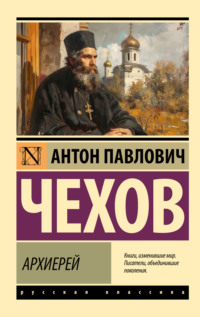 полная версия
полная версияLove and Other Stories
He listened to the engineer without interest, with the condescending indifference with which cadets in the senior classes listen to an effusive and good-natured old attendant. It seemed as though there were nothing new to him in what the engineer said, and that if he had not himself been too lazy to talk, he would have said something newer and cleverer. Meanwhile Ananyev would not desist. He had by now laid aside his good-humoured, jocose tone and spoke seriously, even with a fervour which was quite out of keeping with his expression of calmness. Apparently he had no distaste for abstract subjects, was fond of them, indeed, but had neither skill nor practice in the handling of them. And this lack of practice was so pronounced in his talk that I did not always grasp his meaning at once.
"I hate those ideas with all my heart!" he said, "I was infected by them myself in my youth, I have not quite got rid of them even now, and I tell you – perhaps because I am stupid and such thoughts were not the right food for my mind – they did me nothing but harm. That's easy to understand! Thoughts of the aimlessness of life, of the insignificance and transitoriness of the visible world, Solomon's 'vanity of vanities' have been, and are to this day, the highest and final stage in the realm of thought. The thinker reaches that stage and – comes to a halt! There is nowhere further to go. The activity of the normal brain is completed with this, and that is natural and in the order of things. Our misfortune is that we begin thinking at that end. What normal people end with we begin with. From the first start, as soon as the brain begins working independently, we mount to the very topmost, final step and refuse to know anything about the steps below."
"What harm is there in that?" said the student.
"But you must understand that it's abnormal," shouted Ananyev, looking at him almost wrathfully. "If we find means of mounting to the topmost step without the help of the lower ones, then the whole long ladder, that is the whole of life, with its colours, sounds, and thoughts, loses all meaning for us. That at your age such reflections are harmful and absurd, you can see from every step of your rational independent life. Let us suppose you sit down this minute to read Darwin or Shakespeare, you have scarcely read a page before the poison shows itself; and your long life, and Shakespeare, and Darwin, seem to you nonsense, absurdity, because you know you will die, that Shakespeare and Darwin have died too, that their thoughts have not saved them, nor the earth, nor you, and that if life is deprived of meaning in that way, all science, poetry, and exalted thoughts seem only useless diversions, the idle playthings of grown up people; and you leave off reading at the second page. Now, let us suppose that people come to you as an intelligent man and ask your opinion about war, for instance: whether it is desirable, whether it is morally justifiable or not. In answer to that terrible question you merely shrug your shoulders and confine yourself to some commonplace, because for you, with your way of thinking, it makes absolutely no difference whether hundreds of thousands of people die a violent death, or a natural one: the results are the same – ashes and oblivion. You and I are building a railway line. What's the use, one may ask, of our worrying our heads, inventing, rising above the hackneyed thing, feeling for the workmen, stealing or not stealing, when we know that this railway line will turn to dust within two thousand years, and so on, and so on… You must admit that with such a disastrous way of looking at things there can be no progress, no science, no art, nor even thought itself. We fancy that we are cleverer than the crowd, and than Shakespeare. In reality our thinking leads to nothing because we have no inclination to go down to the lower steps and there is nowhere higher to go, so our brain stands at the freezing point – neither up nor down; I was in bondage to these ideas for six years, and by all that is holy, I never read a sensible book all that time, did not gain a ha'porth of wisdom, and did not raise my moral standard an inch. Was not that disastrous? Moreover, besides being corrupted ourselves, we bring poison into the lives of those surrounding us. It would be all right if, with our pessimism, we renounced life, went to live in a cave, or made haste to die, but, as it is, in obedience to the universal law, we live, feel, love women, bring up children, construct railways!"
"Our thoughts make no one hot or cold," the student said reluctantly.
"Ah! there you are again! – do stop it! You have not yet had a good sniff at life. But when you have lived as long as I have you will know a thing or two! Our theory of life is not so innocent as you suppose. In practical life, in contact with human beings, it leads to nothing but horrors and follies. It has been my lot to pass through experiences which I would not wish a wicked Tatar to endure."
"For instance?" I asked.
"For instance?" repeated the engineer.
He thought a minute, smiled and said:
"For instance, take this example. More correctly, it is not an example, but a regular drama, with a plot and a dénouement. An excellent lesson! Ah, what a lesson!"
He poured out wine for himself and us, emptied his glass, stroked his broad chest with his open hands, and went on, addressing himself more to me than to the student.
"It was in the year 187 – , soon after the war, and when I had just left the University. I was going to the Caucasus, and on the way stopped for five days in the seaside town of N. I must tell you that I was born and grew up in that town, and so there is nothing odd in my thinking N. extraordinarily snug, cosy, and beautiful, though for a man from Petersburg or Moscow, life in it would be as dreary and comfortless as in any Tchuhloma or Kashira. With melancholy I passed by the high school where I had been a pupil; with melancholy I walked about the very familiar park, I made a melancholy attempt to get a nearer look at people I had not seen for a long time – all with the same melancholy.
"Among other things, I drove out one evening to the so-called Quarantine. It was a small mangy copse in which, at some forgotten time of plague, there really had been a quarantine station, and which was now the resort of summer visitors. It was a drive of three miles from the town along a good soft road. As one drove along one saw on the left the blue sea, on the right the unending gloomy steppe; there was plenty of air to breathe, and wide views for the eyes to rest on. The copse itself lay on the seashore. Dismissing my cabman, I went in at the familiar gates and first turned along an avenue leading to a little stone summer-house which I had been fond of in my childhood. In my opinion that round, heavy summer-house on its clumsy columns, which combined the romantic charm of an old tomb with the ungainliness of a Sobakevitch,* was the most poetical nook in the whole town. It stood at the edge above the cliff, and from it there was a splendid view of the sea.
*A character in Gogol's Dead Souls. – Translator's Note.
"I sat down on the seat, and, bending over the parapet, looked down. A path ran from the summer-house along the steep, almost overhanging cliff, between the lumps of clay and tussocks of burdock. Where it ended, far below on the sandy shore, low waves were languidly foaming and softly purring. The sea was as majestic, as infinite, and as forbidding as seven years before when I left the high school and went from my native town to the capital; in the distance there was a dark streak of smoke – a steamer was passing – and except for this hardly visible and motionless streak and the sea-swallows that flitted over the water, there was nothing to give life to the monotonous view of sea and sky. To right and left of the summer-house stretched uneven clay cliffs.
"You know that when a man in a melancholy mood is left tête-à-tête with the sea, or any landscape which seems to him grandiose, there is always, for some reason, mixed with melancholy, a conviction that he will live and die in obscurity, and he reflectively snatches up a pencil and hastens to write his name on the first thing that comes handy. And that, I suppose, is why all convenient solitary nooks like my summer-house are always scrawled over in pencil or carved with penknives. I remember as though it were to-day; looking at the parapet I read: 'Ivan Korolkov, May 16, 1876.' Beside Korolkov some local dreamer had scribbled freely, adding:
"'He stood on the desolate ocean's strand,While his soul was filled with imaginings grand.'And his handwriting was dreamy, limp like wet silk. An individual called Kross, probably an insignificant, little man, felt his unimportance so deeply that he gave full licence to his penknife and carved his name in deep letters an inch high. I took a pencil out of my pocket mechanically, and I too scribbled on one of the columns. All that is irrelevant, however.. You must forgive me – I don't know how to tell a story briefly.
"I was sad and a little bored. Boredom, the stillness, and the purring of the sea gradually brought me to the line of thought we have been discussing. At that period, towards the end of the 'seventies, it had begun to be fashionable with the public, and later, at the beginning of the 'eighties, it gradually passed from the general public into literature, science, and politics. I was no more than twenty-six at the time, but I knew perfectly well that life was aimless and had no meaning, that everything was a deception and an illusion, that in its essential nature and results a life of penal servitude in Sahalin was not in any way different from a life spent in Nice, that the difference between the brain of a Kant and the brain of a fly was of no real significance, that no one in this world is righteous or guilty, that everything was stuff and nonsense and damn it all! I lived as though I were doing a favour to some unseen power which compelled me to live, and to which I seemed to say: 'Look, I don't care a straw for life, but I am living!' I thought on one definite line, but in all sorts of keys, and in that respect I was like the subtle gourmand who could prepare a hundred appetising dishes from nothing but potatoes. There is no doubt that I was one-sided and even to some extent narrow, but I fancied at the time that my intellectual horizon had neither beginning nor end, and that my thought was as boundless as the sea. Well, as far as I can judge by myself, the philosophy of which we are speaking has something alluring, narcotic in its nature, like tobacco or morphia. It becomes a habit, a craving. You take advantage of every minute of solitude to gloat over thoughts of the aimlessness of life and the darkness of the grave. While I was sitting in the summer-house, Greek children with long noses were decorously walking about the avenues. I took advantage of the occasion and, looking at them, began reflecting in this style:
"'Why are these children born, and what are they living for? Is there any sort of meaning in their existence? They grow up, without themselves knowing what for; they will live in this God-forsaken, comfortless hole for no sort of reason, and then they will die..'
"And I actually felt vexed with those children because they were walking about decorously and talking with dignity, as though they did not hold their little colourless lives so cheap and knew what they were living for… I remember that far away at the end of an avenue three feminine figures came into sight. Three young ladies, one in a pink dress, two in white, were walking arm-in-arm, talking and laughing. Looking after them, I thought:
"'It wouldn't be bad to have an affair with some woman for a couple of days in this dull place.'
"I recalled by the way that it was three weeks since I had visited my Petersburg lady, and thought that a passing love affair would come in very appropriately for me just now. The young lady in white in the middle was rather younger and better looking than her companions, and judging by her manners and her laugh, she was a high-school girl in an upper form. I looked, not without impure thoughts, at her bust, and at the same time reflected about her: 'She will be trained in music and manners, she will be married to some Greek – God help us! – will lead a grey, stupid, comfortless life, will bring into the world a crowd of children without knowing why, and then will die. An absurd life!'
"I must say that as a rule I was a great hand at combining my lofty ideas with the lowest prose.
"Thoughts of the darkness of the grave did not prevent me from giving busts and legs their full due. Our dear Baron's exalted ideas do not prevent him from going on Saturdays to Vukolovka on amatory expeditions. To tell the honest truth, as far as I remember, my attitude to women was most insulting. Now, when I think of that high-school girl, I blush for my thoughts then, but at the time my conscience was perfectly untroubled. I, the son of honourable parents, a Christian, who had received a superior education, not naturally wicked or stupid, felt not the slightest uneasiness when I paid women Blutgeld, as the Germans call it, or when I followed high-school girls with insulting looks… The trouble is that youth makes its demands, and our philosophy has nothing in principle against those demands, whether they are good or whether they are loathsome. One who knows that life is aimless and death inevitable is not interested in the struggle against nature or the conception of sin: whether you struggle or whether you don't, you will die and rot just the same… Secondly, my friends, our philosophy instils even into very young people what is called reasonableness. The predominance of reason over the heart is simply overwhelming amongst us. Direct feeling, inspiration – everything is choked by petty analysis. Where there is reasonableness there is coldness, and cold people – it's no use to disguise it – know nothing of chastity. That virtue is only known to those who are warm, affectionate, and capable of love. Thirdly, our philosophy denies the significance of each individual personality. It's easy to see that if I deny the personality of some Natalya Stepanovna, it's absolutely nothing to me whether she is insulted or not. To-day one insults her dignity as a human being and pays her Blutgeld, and next day thinks no more of her.
"So I sat in the summer-house and watched the young ladies. Another woman's figure appeared in the avenue, with fair hair, her head uncovered and a white knitted shawl on her shoulders. She walked along the avenue, then came into the summer-house, and taking hold of the parapet, looked indifferently below and into the distance over the sea. As she came in she paid no attention to me, as though she did not notice me. I scrutinised her from foot to head (not from head to foot, as one scrutinises men) and found that she was young, not more than five-and-twenty, nice-looking, with a good figure, in all probability married and belonging to the class of respectable women. She was dressed as though she were at home, but fashionably and with taste, as ladies are, as a rule, in N.
"'This one would do nicely,' I thought, looking at her handsome figure and her arms; 'she is all right… She is probably the wife of some doctor or schoolmaster..'
"But to make up to her – that is, to make her the heroine of one of those impromptu affairs to which tourists are so prone – was not easy and, indeed, hardly possible. I felt that as I gazed at her face. The way she looked, and the expression of her face, suggested that the sea, the smoke in the distance, and the sky had bored her long, long ago, and wearied her sight. She seemed to be tired, bored, and thinking about something dreary, and her face had not even that fussy, affectedly indifferent expression which one sees in the face of almost every woman when she is conscious of the presence of an unknown man in her vicinity.
"The fair-haired lady took a bored and passing glance at me, sat down on a seat and sank into reverie, and from her face I saw that she had no thoughts for me, and that I, with my Petersburg appearance, did not arouse in her even simple curiosity. But yet I made up my mind to speak to her, and asked: 'Madam, allow me to ask you at what time do the waggonettes go from here to the town?'
"'At ten or eleven, I believe..'"
"I thanked her. She glanced at me once or twice, and suddenly there was a gleam of curiosity, then of something like wonder on her passionless face… I made haste to assume an indifferent expression and to fall into a suitable attitude; she was catching on! She suddenly jumped up from the seat, as though something had bitten her, and examining me hurriedly, with a gentle smile, asked timidly:
"'Oh, aren't you Ananyev?'
"'Yes, I am Ananyev,' I answered.
"'And don't you recognise me? No?'
"I was a little confused. I looked intently at her, and – would you believe it? – I recognised her not from her face nor her figure, but from her gentle, weary smile. It was Natalya Stepanovna, or, as she was called, Kisotchka, the very girl I had been head over ears in love with seven or eight years before, when I was wearing the uniform of a high-school boy. The doings of far, vanished days, the days of long ago… I remember this Kisotchka, a thin little high-school girl of fifteen or sixteen, when she was something just for a schoolboy's taste, created by nature especially for Platonic love. What a charming little girl she was! Pale, fragile, light – she looked as though a breath would send her flying like a feather to the skies – a gentle, perplexed face, little hands, soft long hair to her belt, a waist as thin as a wasp's – altogether something ethereal, transparent like moonlight – in fact, from the point of view of a high-school boy a peerless beauty… Wasn't I in love with her! I did not sleep at night. I wrote verses… Sometimes in the evenings she would sit on a seat in the park while we schoolboys crowded round her, gazing reverently; in response to our compliments, our sighing, and attitudinising, she would shrink nervously from the evening damp, screw up her eyes, and smile gently, and at such times she was awfully like a pretty little kitten. As we gazed at her every one of us had a desire to caress her and stroke her like a cat, hence her nickname of Kisotchka.
"In the course of the seven or eight years since we had met, Kisotchka had greatly changed. She had grown more robust and stouter, and had quite lost the resemblance to a soft, fluffy kitten. It was not that her features looked old or faded, but they had somehow lost their brilliance and looked sterner, her hair seemed shorter, she looked taller, and her shoulders were quite twice as broad, and what was most striking, there was already in her face the expression of motherliness and resignation commonly seen in respectable women of her age, and this, of course, I had never seen in her before… In short, of the school-girlish and the Platonic her face had kept the gentle smile and nothing more..
"We got into conversation. Learning that I was already an engineer,
Kisotchka was immensely delighted.
"'How good that is!' she said, looking joyfully into my face. 'Ah, how good! And how splendid you all are! Of all who left with you, not one has been a failure – they have all turned out well. One an engineer, another a doctor, a third a teacher, another, they say, is a celebrated singer in Petersburg… You are all splendid, all of you… Ah, how good that is!'
"Kisotchka's eyes shone with genuine goodwill and gladness. She was admiring me like an elder sister or a former governess. 'While I looked at her sweet face and thought, It wouldn't be bad to get hold of her to-day!'
"'Do you remember, Natalya Stepanovna,' I asked her, 'how I once brought you in the park a bouquet with a note in it? You read my note, and such a look of bewilderment came into your face..'
"'No, I don't remember that,' she said, laughing. 'But I remember how you wanted to challenge Florens to a duel over me..'
"'Well, would you believe it, I don't remember that..'
"'Well, that's all over and done with.' sighed Kisotchka. 'At one time I was your idol, and now it is my turn to look up to all of you..'
"From further conversation I learned that two years after leaving the high school, Kisotchka had been married to a resident in the town who was half Greek, half Russian, had a post either in the bank or in the insurance society, and also carried on a trade in corn. He had a strange surname, something in the style of Populaki or Skarandopulo… Goodness only knows – I have forgotten… As a matter of fact, Kisotchka spoke little and with reluctance about herself. The conversation was only about me. She asked me about the College of Engineering, about my comrades, about Petersburg, about my plans, and everything I said moved her to eager delight and exclamations of, 'Oh, how good that is!'
"We went down to the sea and walked over the sands; then when the night air began to blow chill and damp from the sea we climbed up again. All the while our talk was of me and of the past. We walked about until the reflection of the sunset had died away from the windows of the summer villas.
"'Come in and have some tea,' Kisotchka suggested. 'The samovar must have been on the table long ago… I am alone at home,' she said, as her villa came into sight through the green of the acacias. 'My husband is always in the town and only comes home at night, and not always then, and I must own that I am so dull that it's simply deadly.'
"I followed her in, admiring her back and shoulders. I was glad that she was married. Married women are better material for temporary love affairs than girls. I was also pleased that her husband was not at home. At the same time I felt that the affair would not come off..
"We went into the house. The rooms were smallish and had low ceilings, and the furniture was typical of the summer villa (Russians like having at their summer villas uncomfortable heavy, dingy furniture which they are sorry to throw away and have nowhere to put), but from certain details I could observe that Kisotchka and her husband were not badly off, and must be spending five or six thousand roubles a year. I remember that in the middle of the room which Kisotchka called the dining-room there was a round table, supported for some reason on six legs, and on it a samovar and cups. At the edge of the table lay an open book, a pencil, and an exercise book. I glanced at the book and recognised it as 'Malinin and Burenin's Arithmetical Examples.' It was open, as I now remember, at the 'Rules of Compound Interest.'
"'To whom are you giving lessons?' I asked Kisotchka.
"'Nobody,' she answered. 'I am just doing some… I have nothing to do, and am so bored that I think of the old days and do sums.'
"'Have you any children?'
"'I had a baby boy, but he only lived a week.'
"We began drinking tea. Admiring me, Kisotchka said again how good it was that I was an engineer, and how glad she was of my success. And the more she talked and the more genuinely she smiled, the stronger was my conviction that I should go away without having gained my object. I was a connoisseur in love affairs in those days, and could accurately gauge my chances of success. You can boldly reckon on success if you are tracking down a fool or a woman as much on the look out for new experiences and sensations as yourself, or an adventuress to whom you are a stranger. If you come across a sensible and serious woman, whose face has an expression of weary submission and goodwill, who is genuinely delighted at your presence, and, above all, respects you, you may as well turn back. To succeed in that case needs longer than one day.
"And by evening light Kisotchka seemed even more charming than by day. She attracted me more and more, and apparently she liked me too, and the surroundings were most appropriate: the husband not at home, no servants visible, stillness around… Though I had little confidence in success, I made up my mind to begin the attack anyway. First of all it was necessary to get into a familiar tone and to change Kisotchka's lyrically earnest mood into a more frivolous one.
"'Let us change the conversation, Natalya Stepanovna,' I began. 'Let us talk of something amusing. First of all, allow me, for the sake of old times, to call you Kisotchka.'
"She allowed me.
"'Tell me, please, Kisotchka,' I went on, 'what is the matter with all the fair sex here. What has happened to them? In old days they were all so moral and virtuous, and now, upon my word, if one asks about anyone, one is told such things that one is quite shocked at human nature… One young lady has eloped with an officer; another has run away and carried off a high-school boy with her; another – a married woman – has run away from her husband with an actor; a fourth has left her husband and gone off with an officer, and so on and so on. It's a regular epidemic! If it goes on like this there won't be a girl or a young woman left in your town!'









